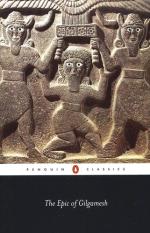|
This section contains 3,834 words (approx. 13 pages at 300 words per page) |

|
SOURCE: Keenan, James G. “Gilgamesh: An Appreciation.” In The Epic of Gilgamesh, translated by Danny P. Jackson, pp. xlii-l. Wauconda, Ill.: Bolchazy-Carducci Publishers, 1997.
In the following essay, Keenan discusses how the Epic of Gilgamesh overcomes certain literary weaknesses by its presentation of major themes.
Gilgamesh is often considered an epic, but if so, it fails to meet all the classically mandated requirements: “An epic is a long narrative poem …”; for Gilgamesh is obviously much too short. But Gilgamesh is a poetic narrative, and it does, like the great classical epics—the Iliad, the Odyssey, and the Aeneid—focus on a single hero. But when we first hear of him (Tablet I), the king of Uruk doesn't seem very heroic. Whatever his past accomplishments, he now suffers a life without joy. His main current interest rests in his power to command private satisfaction, to deflower Uruk's virgin brides on...
|
This section contains 3,834 words (approx. 13 pages at 300 words per page) |

|


